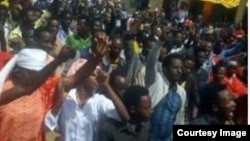Demonstrators have taken to the streets in at least a dozen southern Ethiopian towns this week to protest the federal government's renewal of a license for a mining company that they say jeopardizes local residents' health and economic well-being.
The protesters, in the restive Oromia region, criticize a 10-year license for Mohammed International Development Research and Organization Cos., or MIDROC, to continue mining gold at a site near the town of Shakiso and the Lega Dembi river.
The demonstrations followed the April 27 report of the license renewal for MIDROC, which has operated the mine since the late 1990s. The company is owned by African-born billionaire Sheikh Mohammed Hussein al-Amoudi, detained since November in what Saudi Arabia calls an anti-corruption sweep.
"Demonstrators are very angry. They are blocking roads and demanding change," Dulacha Lafe, administrator for the local Goro Dolaa district, told VOA in a phone interview on Monday, when the protests began. He said local authorities "understand and agree with their concern. However, we don't have the power to solve the problem. [The] Oromia regional government and the federal government should help us out. The license should not have been renewed at all."
Some high school students skipped classes this week to join in the anti-mining protests, which have erupted periodically over the years. A Shakiso resident, who asked VOA to withhold his name out of fear of retaliation, said Friday that some students "were beaten because of protesting and asking for their constitutional rights."
Abdu Kadir, an inspector for the local Guji district government, told VOA: "Some schools have been closed for a few days, and today students are back in class. Nobody is arrested or anything."
Chemicals blamed for ailments
Protesters contend that chemicals used at the mine contaminate the water and air, sickening humans and animals with everything from respiratory illnesses to miscarriages, birth defects and disabilities.
"Mothers are having miscarriages every single day," Abebech Elias, a health care provider from the Shakiso area, told state-owned Oromia Broadcasting Network in a report that aired Tuesday. "I am not seeing this in other places, only around the mining site."
Also in that report, MIDROC's environmental protection expert, Ahmed Mohammed, said the company used chemicals including hydrogen cyanide. "[E]ven a small amount" of hydrogen cyanide "can contaminate water and can cause serious consequences," he said. He did not specify the amounts used in MIDROC's operations, nor what safety precautions, if any, the company had taken.
MIDROC did not respond to VOA's attempts to reach it by phone and via its website.
The website MiningFacts.org explains that cyanide, "in the form of a very dilute sodium cyanide solution, is used to dissolve and separate gold from ore. … Cyanide is toxic in large doses and is strictly regulated in most jurisdictions worldwide to protect people, animals and the aquatic environment."
Local residents are concerned not only about health but also economics, said Galchu Halake, a community leader and one of the protesters in Arkalo town.
"They want the license to be revoked since the company has been mining gold for export without contributing to the local economy or the society's well-being," Galchu said.
Bacha Faji, a spokesman for Ethiopia's Ministry of Mines, Petroleum and Natural Gas, said the renewed contract's terms direct a share of the company's earnings to local communities.
"Two percent of the income the company generates will go to locals," Bacha said in an interview with the BBC this week. He said that decision followed a government investigation "into what the company was doing for the past 20 years" and factored in local grievances.
Those include concerns about mining-related environmental degradation, health risks, displacement of housing and "the failure to hire local labor," the international organization Human Rights Watch noted in a 2016 report.That report focused on Ethiopian security forces' crackdowns, including "the killings and mass arrest of protesters" over gold mining and other issues.
In April 2016, Badada Gelchu was shot and killed at his home in Shakiso after participating in demonstrations against the gold mine. His family told VOA then that security agents "went to his house and killed him, accusing him of organizing the protests in our area."
Skeptical of deal
Addisu Bulala, a leader of the opposition Oromo Federalist Congress party, expressed skepticism about MIDROC's renewed license. Speaking with VOA by phone, he mentioned televised reports showing children with deformities allegedly linked to contaminants from mining.
"Until today, there's been no compensation, no change. ... No one is charged for crimes committed" involving environmental pollution, Addisu said. "This is basically selling the community for dollars. Our party is concerned deeply, and no responsible government would allow this."
Oromia regional officials are "not accepting" the federal mining ministry's licensing decision, said Negeri Lencho, spokesman for the regional government. "Even if the [ministry] says it conducted an investigation, we have no idea of the findings. They did not share the results. It is disrespectful to us and our people. ... They admitted the lack of transparency and agreed to figure this out together."
Negeri said the regional government was conducting its own investigation into MIDROC's mining practices and environmental impact.
"We want our people to understand that, as a regional government, their concerns and questions are ours, too," he added.
Ethiopia still is under a state of emergency imposed in February after the surprise resignation of Prime Minister Hailemariam Desalegn. His successor, Abiy Ahmed, confirmed in April, is the country's first prime minister from the Oromo ethnic group, which has long sought equal representation in government.
Contributors to this report include Namo Dandi, Tigist Geme, Sora Halake and Tujube Hora of VOA's Horn of Africa service.






